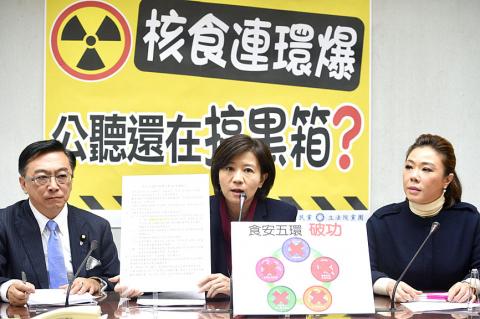The government is to put on hold a planned easing of a ban on food imports from five Japanese prefectures amid public misgivings about food safety, Executive Yuan spokesman Hsu Kuo-yung (徐國勇) said yesterday.
Hsu said at a news conference that the Cabinet has to establish a sound inspection and management mechanism before talking about easing the ban.
Hsu said that Premier Lin Chuan (林全) has stressed the importance of “rebuilding public trust in the government’s management of food safety,” after presiding over a cross-agency meeting on Wednesday.

Photo: Peter Lo, Taipei Times
“Without a sound inspection and management mechanism, there can be no question of such an opening,” Hsu quoted Lin as saying.
Taiwan banned food imports from Japan’s Fukushima, Ibaraki, Tochigi, Gunma and Chiba prefectures in the wake of the Fukushima Dai-ichi nuclear power plant disaster following a massive earthquake and tsunami in Japan on March 11, 2011.
Several brands of natto (fermented soy beans) containing packets of soy sauce allegedly from Chiba and Ibaraki prefectures were reportedly found in Taiwan this week.
Hsu said that although food products from Fukushima and its surrounding prefectures are banned, there are composite packaging foods, such as condiment sachets in packets of instant noodles, that have not been subjected to the ban.
“The government will review the issue and plug any loopholes,” Hsu said.
Before establishing a sound management mechanism, the government will not make a decision, “and there is no timetable for any such opening,” Hsu said.
Three more public hearings on the import ban are scheduled, Hsu said, adding that holding the hearings is important because they help to establish a model for future public hearings and help clarify information, as the public has heard many rumors.
The public hearings are to be presided over by civic groups rather than government officials in a bid to gather public opinion on the issue, he said, adding that the findings would be passed on to the government.
Hsu Fu (許輔), director of the Executive Yuan’s food safety office, said that all questions raised by the groups would be discussed and clarified.
The Cabinet held 10 public hearings across Taiwan from Nov. 12 to Nov. 14 after announcing them on Nov. 10, but critics saw them as essentially for show to pave the way for lifting the ban.
Questions were raised about why the government seemed in such a rush to hold the hearings, with some hearings ending in disarray amid protests.
Hsu said that if the public is dissatisfied after the three public hearings, the government will review the contentious points and if an effective food safety plan cannot be agreed upon, “it will not rule out the possibility of maintaining the current ban.”

A Ministry of Foreign Affairs official yesterday said that a delegation that visited China for an APEC meeting did not receive any kind of treatment that downgraded Taiwan’s sovereignty. Department of International Organizations Director-General Jonathan Sun (孫儉元) said that he and a group of ministry officials visited Shenzhen, China, to attend the APEC Informal Senior Officials’ Meeting last month. The trip went “smoothly and safely” for all Taiwanese delegates, as the Chinese side arranged the trip in accordance with long-standing practices, Sun said at the ministry’s weekly briefing. The Taiwanese group did not encounter any political suppression, he said. Sun made the remarks when

The Taiwanese passport ranked 33rd in a global listing of passports by convenience this month, rising three places from last month’s ranking, but matching its position in January last year. The Henley Passport Index, an international ranking of passports by the number of designations its holder can travel to without a visa, showed that the Taiwan passport enables holders to travel to 139 countries and territories without a visa. Singapore’s passport was ranked the most powerful with visa-free access to 192 destinations out of 227, according to the index published on Tuesday by UK-based migration investment consultancy firm Henley and Partners. Japan’s and

BROAD AGREEMENT: The two are nearing a trade deal to reduce Taiwan’s tariff to 15% and a commitment for TSMC to build five more fabs, a ‘New York Times’ report said Taiwan and the US have reached a broad consensus on a trade deal, the Executive Yuan’s Office of Trade Negotiations said yesterday, after a report said that Washington is set to reduce Taiwan’s tariff rate to 15 percent. The New York Times on Monday reported that the two nations are nearing a trade deal to reduce Taiwan’s tariff rate to 15 percent and commit Taiwan Semiconductor Manufacturing Co (TSMC, 台積電) to building at least five more facilities in the US. “The agreement, which has been under negotiation for months, is being legally scrubbed and could be announced this month,” the paper said,

MIXED SOURCING: While Taiwan is expanding domestic production, it also sources munitions overseas, as some, like M855 rounds, are cheaper than locally made ones Taiwan and the US plan to jointly produce 155mm artillery shells, as the munition is in high demand due to the Ukraine-Russia war and should be useful in Taiwan’s self-defense, Armaments Bureau Director-General Lieutenant General Lin Wen-hsiang (林文祥) told lawmakers in Taipei yesterday. Lin was responding to questions about Taiwan’s partnership with allies in producing munitions at a meeting of the legislature’s Foreign Affairs and National Defense Committee. Given the intense demand for 155mm artillery shells in Ukraine’s defense against the Russian invasion, and in light of Taiwan’s own defensive needs, Taipei and Washington plan to jointly produce 155mm shells, said Lin,